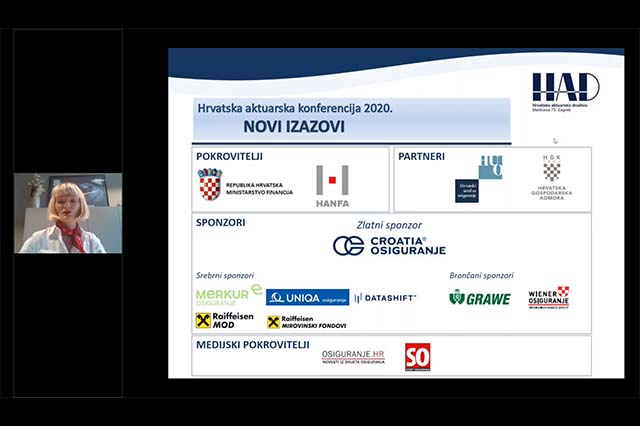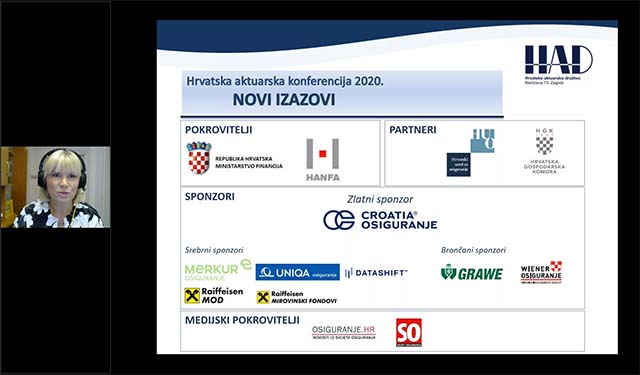The Croatian Actuarial Association (CAA) organised the fifth Croatian Actuarial Conference entitled “New Challenges”.
The Conference was held on September 17th and 18th 2020 under the auspices of the Ministry of Finance and the Croatian Financial Services Supervisory Agency. The partners of the Conference were the Croatian Chamber of Commerce and the Croatian Insurance Bureau. Distinguished domestic and foreign insurance experts and scientists were participating in the Conference which gathered more than 170 participants from the country and abroad.

Introductory speeches were given by the President of CAA, Ms. Lidija Pecigoš Višnjić, and a member of the Management Board of the Croatian Financial Services Supervisory Agency, Ms. Ilijana Jeleč.
“I am pleased to say that the Conference brings together an increasing number of actuaries, experts and scientists associated with the insurance industry each year. Given the circumstances caused by Covid, the Conference is being held entirely online this year” pointed out Mrs. Pecigoš Višnjić in her introductory speech. After thanking all the sponsors, partners and lecturers who contributed to the Conference, she said that this year’s conference is called “New Challenges” alluding to new trends and new events that are following. This includes the impact of Covid on the insurance industry, the role of actuaries and other industry experts in the pandemic environment, major technological changes and digitalization of the industry and its impact on the industry. The president of CAA pointed out that the Conference will include topics like artificial intelligence and machine learning in risk assessment and management, as well as topics about the role of actuaries and all those involved in data analysis in this new environment.
Ms. Ilijana Jeleč began her presentation with the following words “Believe that the name of the conference is quite appropriate for these times since we were not lacking the “new challenges” this year.” Ms. Jeleč pointed out the correlation between the movement of gross written premium and GDP, comparing the decline in GDP of 15.1 percent in the second quarter of 2020, which is also the largest decline at the quarterly level since we became independent, with the decline in gross written premium of 9.7 percent in the second quarter of 2020 compared to the same period last year. Ms. Jeleč said that they expect GDP to fall by 8.1 percent compared to last year, while the written premium will be 4.4 percent lower primarily due to the negative trend in life insurance premiums, which again showed weaker resilience to macroeconomic indicators in times of crisis.
Ms. Jeleč pointed out that non-life insurance, although on a downward trajectory of growth, still showed somewhat greater resilience to the crisis, primarily due to the dominance of compulsory car insurance in the structure of total non-life insurance premiums.
Regarding the solvency position, Ms. Jeleč points out that the insurance market is stable and expects that despite the current extraordinary circumstances, the capitalization of insurance companies will continue to be adequate.
The structure of investments according to Solvency II is still dominated by government bonds with a share of 54.6 percent, although due to the low interest rate environment, there is an increase in alternative investments that bring higher yields and risk diversification, such as investing in corporate bonds, stocks and investment funds.
Referring to the earthquake in Zagreb on March 22nd 2020, Ms. Jeleč pointed out that in the first 7 months of 2020, the gross premium for earthquake insurance increased by 26.2% compared to the same period last year, but also the liquidated claims increased, with a significant increase occurring as early as April.
In her speech, Ms. Ilijana Jeleč highlighted the new challenges facing the industry, such as the solvency audit and the new IFRS 17 standard. An extremely important market exercise is underway to assess the impact of the introduction of the euro as the official currency in the Republic of Croatia on the solvency position of insurance companies, which is expected to be introduced in 2023.
Finally, Ms. Jeleč welcomed the topic of changes in the field of private pensions in the form of Pan-European Personal Pension Products (PEPP) and further European initiatives to increase the transparency of pension funds.
The Conference was followed with a lecture by Richard Willets, on the topic “Recent developments in longevity: understanding the slowdown and assessing the potential impact of COVID” through which he gave an overview of the significant reduction in mortality in the UK especially during first 10 years of 21st century when mortality decreased by 3.3 percent. He stated that the main reason lies in improving the treatment of cardiovascular diseases and in reducing cancer incidence.
Chris Daykin reflected on the short history of the actuarial profession and emphasized the importance of actuaries in his lecture under the title “Building a global actuarial profession”.
In a lecture entitled “Smart Claims”, Jiri Fialka and Tervel Sopov presented a really interesting topic, emphasizing the possibilities of using artificial intelligence and machine learning principles for faster, simpler and ultimately more cost-effective ways of reporting and processing claims.
Albert Ćosić presented a solution for the administration of reinsurance business through a lecture entitled “Reosoft”, emphasizing that it is possible to systematize data retrieval, automate and speed up reinsurance calculation, unify the reporting and analysis system and ultimately relieve actuaries from operative work.

The moderator of the conference was Snježana Bertoncelj. The gold sponsor of the conference is Croatia osiguranje, the silver ones are Merkur osiguranje, Uniqa osiguranje, Raiffeisen MOD, Datashift, Raiffeisen pension funds, while the bronze sponsors are Wiener osiguranje and Grawe osiguranje.
